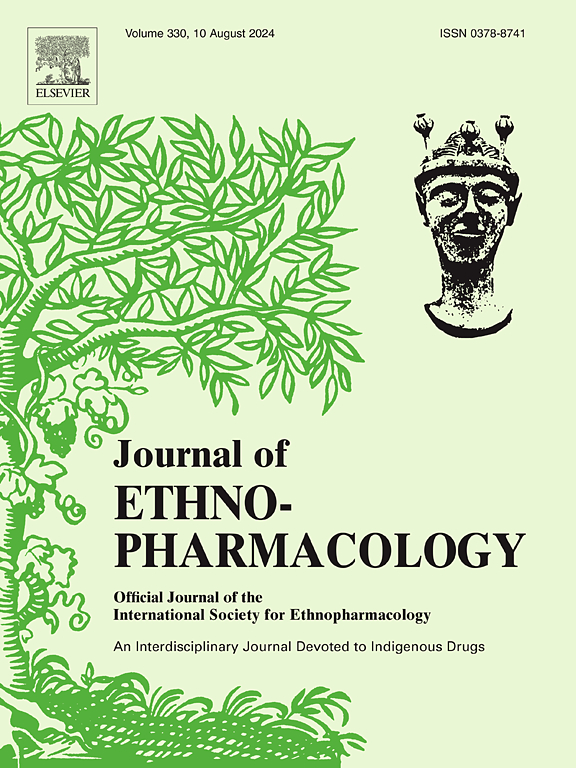Guben Kechuan granule attenuates bronchial asthma by inhibiting NF-κB/STAT3 signaling pathway-mediated apoptosis
IF 4.8
2区 医学
Q1 CHEMISTRY, MEDICINAL
引用次数: 0
Abstract
Ethnopharmacological relevance
Chronic asthma caused by allergies is a lung illness marked by airway remodeling and hyperresponsiveness. Guben Kechuan (GK) granule is a clinically proven formula for treating lung disease. It relieves cough and helps to clear phlegm, but the mechanisms underlying its treatment for asthma are not clear.
Aim of the study
We aimed to elucidate the efficacy and potential mechanisms by which GK ameliorates allergic asthma.
Materials and methods
Ultra-performance liquid chromatography (UHPLC-LTQ-Orbitrap-MS) identified the main chemical components of GK. The efficacy of GK was studied in an ovalbumin/alum (OVA)/AL(OH)3-sensitized rat model of bronchial asthma by measuring cytokine concentrations in serum and alveolar lavage samples, examining tissue pathology, and performing leukocyte counts. The mechanisms underlying its effectiveness in asthma were investigated by both transcriptomic and proteomic analyses.
Results
GK relieved asthma-induced airway inflammation and remodeling, reduced inflammatory cell infiltration, and decreased the levels of the inflammatory cytokines TNF-α, IL-4, IL-5, IL-6, and IL-10. Analysis of the transcriptomic and proteomic results found that asthma activated the transcription factors STAT3 and NF-κB and induced oxidative-stress damage and apoptosis. GK was found to reduce Bax and caspase-3 expression, increase Bcl-2 expression, and inhibit asthma-induced apoptosis. GK downregulated the expression of the transcription factors STAT3 and NF-kB, which decreased the inflammatory response. Decreases in CAT, SOD, and GSH reduced asthma-induced oxidative-stress damage.
Conclusions
Our findings provide evidence that GK alleviates bronchial asthma by inhibiting apoptosis and oxidative stress damage mediated by the NF-κB/STAT3 signaling pathway.

固本咳喘颗粒通过抑制NF-κB/STAT3信号通路介导的细胞凋亡减轻支气管哮喘。
民族药理学相关性:由过敏引起的慢性哮喘是一种以气道重塑和高反应性为特征的肺部疾病。固本咳喘颗粒是临床证实的治疗肺部疾病的方剂。它能止咳、清痰,但其治疗哮喘的机制尚不清楚。研究目的:我们旨在阐明GK改善过敏性哮喘的疗效及其潜在机制。材料与方法:超高效液相色谱法(UHPLC-LTQ-Orbitrap-MS)鉴定了GK的主要化学成分。通过测定血清和肺泡灌洗液中细胞因子的浓度、组织病理学检查和白细胞计数,研究GK在卵白蛋白/明矾(OVA)/AL(OH)3致敏大鼠支气管哮喘模型中的作用。通过转录组学和蛋白质组学分析研究了其对哮喘有效的机制。结果:GK可缓解哮喘气道炎症和重塑,减少炎症细胞浸润,降低炎症因子TNF-α、IL-4、IL-5、IL-6、IL-10水平。转录组学和蛋白质组学分析发现,哮喘激活转录因子STAT3和NF-κB,诱导氧化应激损伤和细胞凋亡。发现GK可降低Bax和caspase-3表达,增加Bcl-2表达,抑制哮喘诱导的细胞凋亡。GK下调转录因子STAT3和NF-kB的表达,降低炎症反应。CAT、SOD和GSH的降低降低了哮喘引起的氧化应激损伤。结论:GK可通过抑制NF-κB/STAT3信号通路介导的支气管哮喘细胞凋亡和氧化应激损伤,从而减轻支气管哮喘的发病。
本文章由计算机程序翻译,如有差异,请以英文原文为准。
求助全文
约1分钟内获得全文
求助全文
来源期刊

Journal of ethnopharmacology
医学-全科医学与补充医学
CiteScore
10.30
自引率
5.60%
发文量
967
审稿时长
77 days
期刊介绍:
The Journal of Ethnopharmacology is dedicated to the exchange of information and understandings about people''s use of plants, fungi, animals, microorganisms and minerals and their biological and pharmacological effects based on the principles established through international conventions. Early people confronted with illness and disease, discovered a wealth of useful therapeutic agents in the plant and animal kingdoms. The empirical knowledge of these medicinal substances and their toxic potential was passed on by oral tradition and sometimes recorded in herbals and other texts on materia medica. Many valuable drugs of today (e.g., atropine, ephedrine, tubocurarine, digoxin, reserpine) came into use through the study of indigenous remedies. Chemists continue to use plant-derived drugs (e.g., morphine, taxol, physostigmine, quinidine, emetine) as prototypes in their attempts to develop more effective and less toxic medicinals.
 求助内容:
求助内容: 应助结果提醒方式:
应助结果提醒方式:


